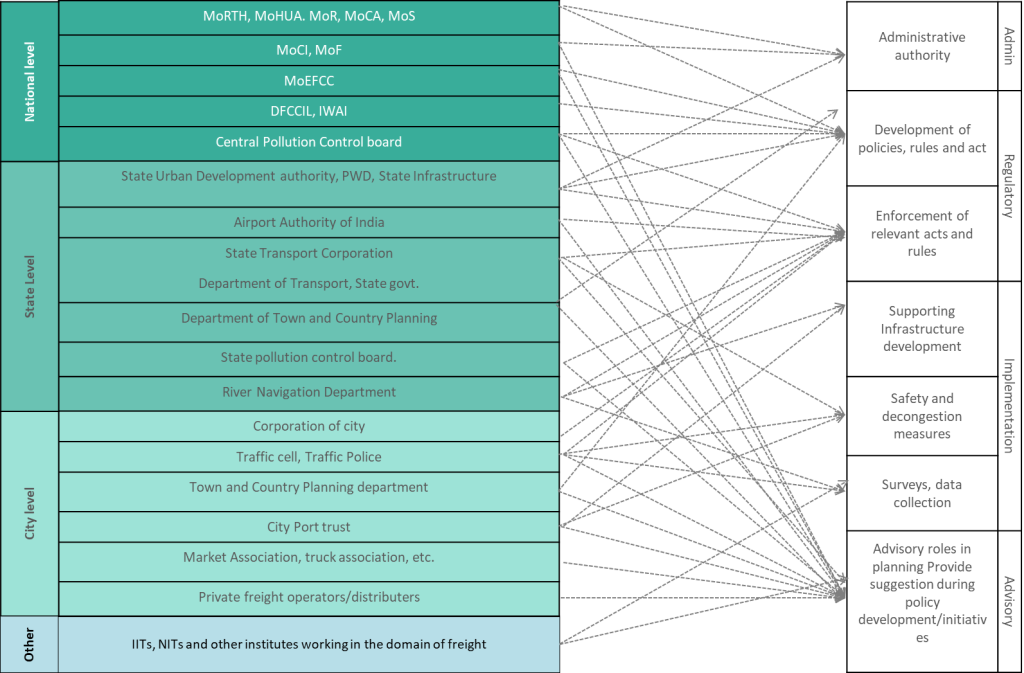Collective Decision Making can Reduce Negative Externalities of Urban Freight

Globalization and the web market are leading to exponential growth in goods movement, specifically in cities. In India, urban freight is an essential component of efficient economic and social development and contributes 10% to 13% of the national GDP. However, the sector is also a major contributor (14%) to the energy sector’s GHG emissions in India, which has 35 of the world’s 50 cities with the worst air quality. (Aniruddha Dhar, 2022)
The country’s urban freight sector is burdened with several problems, including a fragmented governance structure that is made more complex by a lack of clarity of various roles and responsibilities. At present, freight operation involves a wide range of stakeholders, depending on the interests and goals of the organisations. These stakeholders include government agencies (national, state, and city-level), private stakeholders, and institutions as illustrated below:

These organisations work without linkages, communication, and coordination. The city authorities, who are predominantly responsible for the last-mile delivery freight vehicles, lack the institutional capacity and skills to ensure efficient operations because they have no designated institution or department responsible for it. Additionally, a significant disconnect can be observed between industry and the government bodies that handle the city transport network operations. Conflicting personal preferences and distributed decision-making by multiple stakeholders also adversely impact the efficiency of city logistics.
Lack of awareness at operational level
Almost 90% of the goods vehicles are operated by private players, who lack awareness about reducing negative externalities attached to the freight sector through eco-driving, a style of driving that reduces fuel consumption and improves the vehicle’s efficiency. Also, a majority of them and the owners of freight vehicles have just one or only a few freight vehicles, leading to challenges in benchmarking.
A study of passenger car users showed that almost 80% of the emissions by vehicles could be said to be the user’s responsibility (Arokiaraj David, M. Banumathi 2014). The driver of a vehicle is directly responsible for the performance of the vehicle with driving and maintenance techniques, which are often overlooked. In India, there is little focus on providing drivers professional training that usually helps to make them aware of efficient driving practices such as eco-driving.
Additionally, organisations that hold training/ workshops for improving driving skills are challenged by a lack of engagement by the drivers. There are about 5 million truck drivers operating in different parts of the country. It is generally difficult to motivate them to make time for attending the training/ workshops, which are usually conducted for a group of 15-30 participants. Another challenge is to make visible the benefits of good driving practices, as the truck drivers and owners do not practice eco-driving techniques, in spite of being aware of them.
Kochi shows the way
Considering the issues associated with last-mile freight delivery, Kochi Municipal Corporation realised the need for all stakeholders (including RTOs, traffic police, and trade associations) to interact and identify the issues through experiences, and to suggest viable solutions.
As per sub-section 1 of section 10 of the KMTA Act (Kochi Metropolitan Transport Authority), it is mandated to constitute an urban freight committee, along with the public transport operators’ committee, city transport advisory committee, and traffic integration committee. The urban freight committee is responsible for regulating and streamlining freight movement for ensuring safety and decongestion and includes members from the Chamber of Commerce, Cochin Goods Transportation Association, Ernakulam market stall owners’ association, and goods vehicles association, among others.
Kochi city, in partnership with ICLEI South Asia, has taken the initiative to promote eco-driving through a one-day training program. Eco-driving training helps to create a group of well-trained drivers/ instructors and mechanics with good driving and maintenance skills, who can further train other drivers in the organized and unorganized sectors of road transport. According to the Petroleum Conservation Research Association (PCRA), eco-driving has a conservation potential of about 10% to 20%, as compared to normal driving behavior. (Petroleum Conservation Research Association; Ministry of Petroleum & Natural Gas, GoI 2020)
Expected impacts/outcomes
Kochi’s mandate of constituting an urban freight committee may bridge the gap between institutions, leading to better management of the freight sector and a reduction in its negative externalities. This may also ensure collective decision-making as the committee will include several stakeholders.
The training programs for operators/ drivers may also help in attracting private stakeholders to the process of decision making, besides bringing the direct benefits from eco-driving. This will improve the fuel consciousness of drivers, resulting in reduced emissions from freight vehicles. Reduction in vehicle repair and maintenance costs, stress, local air pollution as well as accidents are also observed as positive externalities of eco-driving.
Way forward
There is a need for all stakeholders to interact among themselves, identify the last-mile delivery issues and suggest viable solutions to close the gaps. Municipal corporations could institutionalize a group to improve the skills of authorities and incorporate a multi-stakeholder committee that analyses the baseline of the city, along with the status quo of infrastructure, services, and supporting structures to suggest localized development plans.
The requirements of freight vehicle operators and drivers should also be considered. The multistakeholder committee may conduct consultation sessions with all stakeholders to understand the scenario and give recommendations. Collective decision-making by the multi-stakeholder committee and an improvement in the awareness and skills of drivers may help to reduce the problems related to the fragmentation of the governance structure in the urban freight sector.



